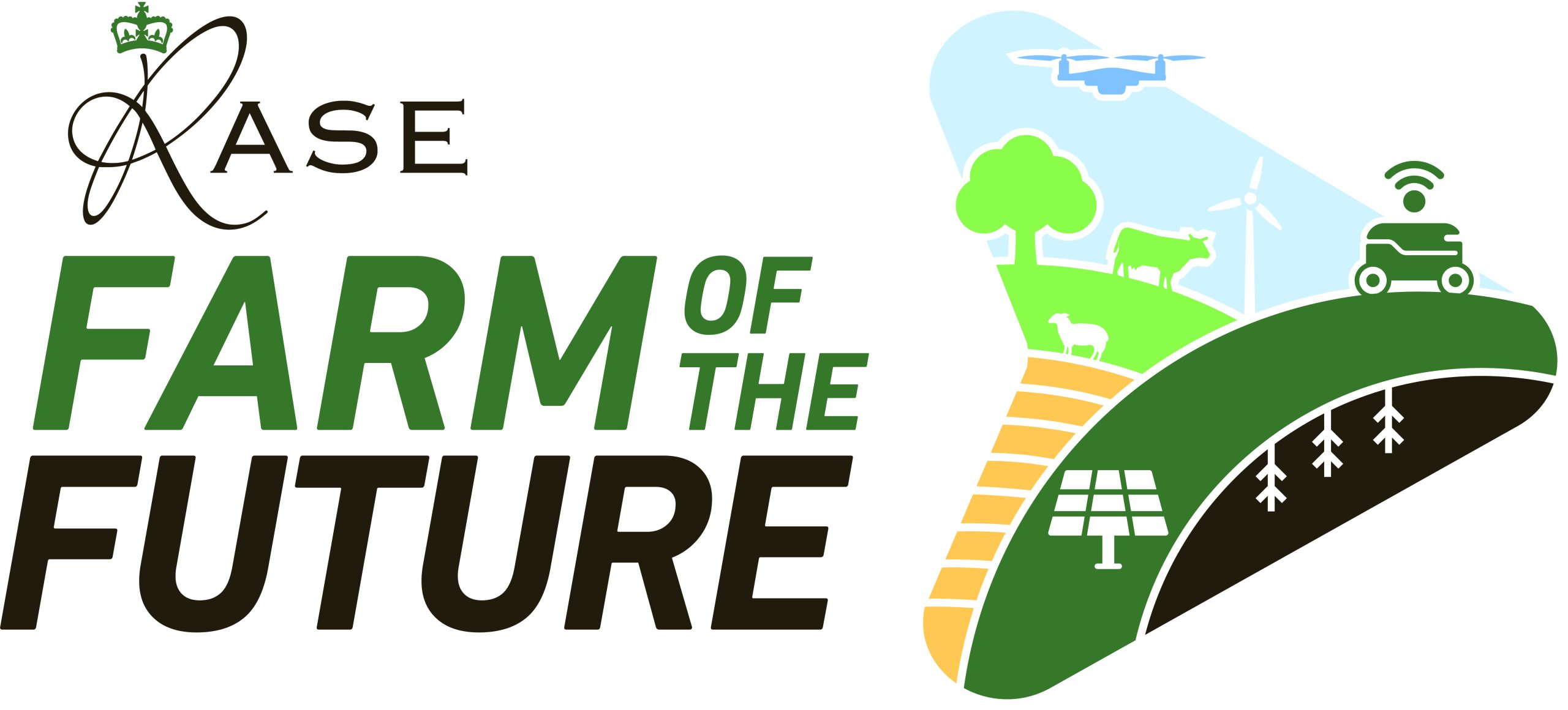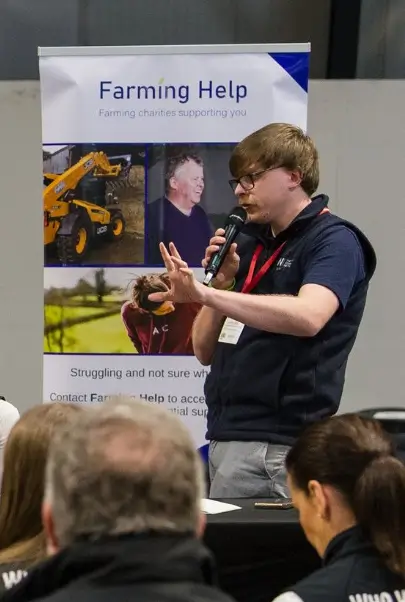Our latest webinar, ‘Farm of the Future: Improving mental health and wellbeing for everyone on farm, everyday’, brought together a group of individuals from the farming industry to discuss how we can best support mental health and wellbeing in farming communities.
As highlighted by the chair of the webinar, David Rose from the Royal Agricultural University, up to one third of farmers in the UK are either possibly or probably depressed, a figure that comes from RABI’s Big Farming Survey.
Improving mental health and wellbeing is about addressing the root causes of poor mental health in farming communities and offering accessible and effective support for those who need it. It is also about understanding how farming communities can be encouraged to thrive in terms of their mental health, rather than to just avoid or tackle problems.
In the recent webinar, organic dairy farmer and Nuffield scholar Sophie Gregory, vet and technical director at the TB Advisory Service Sarah Tomlinson, founder of REAL Success Paul Harris and head of communications and development at the Farming Community Network (FCN) Alex Phillimore all shared insights from their own work and experiences. Between them, they covered ideas for how farmers can look after their own health and wellbeing, how to improve the wellbeing of others on farm and where to reach out to for support.
How to improve mental health and wellbeing on farm
Sophie Gregory is an organic dairy farmer from the Dorset/Devon border. During the webinar, she shared her approach to looking after her own mental wellbeing:
1. Meditate
“People will probably think this is mad, but I meditate every morning, it’s the first thing I do before I get up,” she said. Sophie is part of a group called Focussed Farmers, which was created by Holly Becket who did a Nuffield Scholarship on wellbeing and the tools farmers could potentially use to improve their mental health. Focussed Farmers is a group of farmers who check-in on WhatsApp on a daily basis after meditating, staying accountable to each other.
2. Vitamin D
With the caveat of not being a doctor, Sophie shared that vitamin D supplements have been a gamechanger in her experience, helping her to cope better with the reduced daylight hours during winter.
3. Eating well
Although it can be difficult when busy and getting up very early, as on a dairy farm, Sophie shared that she prioritises eating regularly and well to support her own mental wellbeing.
4. Exercise and fresh air
For those who do not work outside as part of their job, going out at lunchtime to get fresh air and away from the desk is important.
5. Setting goals
“Another big gamechanger for me was setting goals. I’m quite driven, I work well under pressure and I’m achievement based, so setting goals really helps my mental health,” said Sophie. She shared that her goals range from big goals, such as doing a Nuffield, to setting smaller goals like reading more regularly.
6. Attend discussion groups
Sophie shared that she often feels a lot better after getting off farm to attend a farming related discussion group, and realising that people are going through the same stuff.
7. Mix with people who are not farming
In addition to attending farming discussion groups, Sophie also recognised the importance of spending time with people who are not farming. “We’re quite good at being echo chambers and reinforcing what each other are saying, sometimes an outside the industry perspective is helpful,” she said.
8. Remember you are only in control of how you react
Sophie also highlighted that it is not possible to control the circumstances, only how we react to them. “This year has been a bad year for milk price, and a lot of farmers are going to be struggling with that after a high milk price year last year,” she said. “There’s not a lot we can do about it, but we can focus on how we react to that. That’s really helped me.”
Supporting others on farm to thrive
In addition to proactively looking after your own mental health and wellbeing, there are also things farmers can do to support their staff team on a day-to-day basis.
Sophie described encouraging her team to set goals for themselves, ensuring they keep learning new things and keeping as much variety as possible. “Dairy farming can be quite monotonous in the winter, so we try to make sure that everyone is doing every job,” she said. “We also try to do a good Christmas thing, we’ve got a young team so we’re going to a trampolining place this year.”
Paul highlighted the importance of communication in reducing day to day stress on farms. “In our experience, particularly as recruiters, is that one of the main reasons people tell us that they’re struggling on a farm is because they became unhappy, and that’s not because of the hours, the working conditions or even the salary, it’s each other – the boss, a colleague – it’s the way we speak to each other that gives us the most pressure and the most stress.”
Paul explained that often people think that the way to communicate with others is simply how they would like to be communicated with, but that isn’t actually the case. “People need to be spoken to in a way that works for them, because if we don’t, that can be one of the biggest causes of workplace stress,” said Paul.
Paul explained that there might be people who just want to get to the point, they don’t want to stand around chatting in the morning, they want to get on with the work that needs doing, whereas there will be other people who do want to have a cup of tea before they start and find out how people are, and those two sets of people can start to clash and get frustrated with each other. Similarly, there can be people that want to work strictly to protocols, have a plan for the day, work through that carefully, and there are others who enjoy much more variety and want to do things differently every day. “The result is we can have people clashing on farm purely because they are different, and the key is our differences can be our strengths, once we understand them,” he said.
Personality profiling, such as the VITA profiling system, can be used to understand people’s communication preferences. More simply, Paul also recommends asking a colleague how they prefer to be asked to do something, as these conversations can help massively reduce the stress that can come up in daily interactions.
Other tips to reduce stress in the farm team include:
- Have employee meetings – staff can get stressed and concerned if they don’t know what’s happening in the business.
- Give people feedback – people want attention and they want to be told when they’re doing a good job, not just when they’re not doing things well.
- Ensure HR systems and processes are in order – if someone hasn’t got a job description or contract, or they haven’t had the opportunity to raise any concerns, that can cause a lot of stress around the farm.
- Have a mental health policy – the Mental Health Foundation has a workbook that employers can use to help them develop a mental health policy and proactively and positively talk about mental wellbeing in the workplace.
In short, focusing on communication can reduce stress and help with the psychological safety that we need at work.
Mental wellbeing and TB
During the webinar, Sarah spoke about how in her role at TBAS she spends a lot of time talking with farmers when they are at their absolute rock bottom – when they’re dealing with TB.
“My approach as a farm vet is to look at controlling the controllable. This works for the rest of my life as well, I talk to my kids about how we can’t control what other people do, but we can control how we react to it, that gives us some of that power and helps support our wellbeing,” she said.
At TBAS, the team approach TB from a science and evidence point of view. “Even though it can’t stop some of the reaction when TB hits on farm, it can help people understand why some things are happening,” she said. She added that TBAS also provides free advice visits, which are delivered by local vets who are trained to deliver them, so wherever possible it’s someone the farmer already knows and trusts coming out to speak to them about TB.
The TBAS visits are essentially a risk assessment, but focused on what the farmer can achieve. “It’s not us going in and saying this is your biggest risk and this is what you should do,” said Sarah. “We recognise that everyone is overwhelmed with long lists, so we pick out four recommendations that are easy and achievable and cost effective, so you can tick them off.”
Sarah shared that when it comes to TB vets are finding it challenging too. “We don’t go into the job to shut farms down, we’re there to support our farmers and have better businesses, so the TBAS visits are a tool for both farmers and vets to go out and do something proactive on farm,” she said.
Reaching out for support
Also in the webinar, Alex gave an overview of FCN the organisation and how it can help farmers.
FCN is a voluntary organisation and charity supporting people in agriculture through difficult times and in preparing for changes ahead. The organisation has over 350 volunteers, who are farming people, who understand farming pressures.
Alex explained that FCN aims to help people before an issue gets to crisis point, so is encouraging people to reach out in the early stages, and not to think that their challenges aren’t bad enough to warrant support.
Overall, it was encouraging to hear the speakers’ perspectives on mental health and wellbeing in the farming industry, as there are many ways that both individuals and the wider community can take a proactive approach to improving mental health and wellbeing in farming. To hear from each of the speakers in more depth, watch the webinar in the members’ section of the website.

